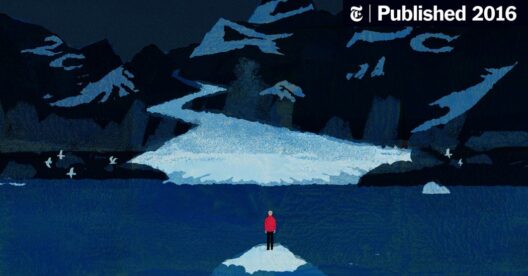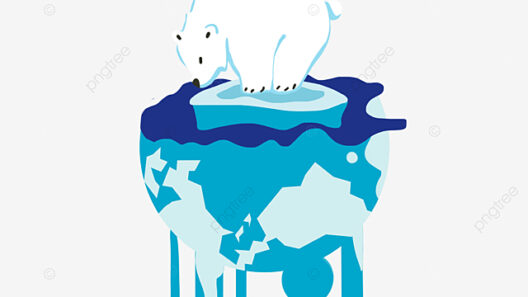The phenomenon of global warming, characterized by an unprecedented increase in Earth’s average surface temperature, has escalated into one of the most pressing challenges of the 21st century. This transformative period, often referred to as the “Anthropocene,” is marked not just by rising temperatures, but also by substantial long-term impacts that permeate various facets of life on Earth. The ramifications of climate change encompass environmental, economic, social, and health-related dimensions, necessitating a comprehensive analysis to elucidate our future prospects in a warming world.
Firstly, let us examine the environmental consequences of global warming, which serve as the foundation upon which further implications are constructed. Rising temperatures contribute directly to the melting of polar ice caps and glaciers. The Arctic region, once a bastion of frosty landscapes, is experiencing rapid depolarization. As a result, rising sea levels threaten coastal regions, inundating low-lying areas and compelling millions to migrate. The Intergovernmental Panel on Climate Change (IPCC) predicts that global sea levels could rise by up to two meters by the year 2100 if current trends persist. Such developments not only compromise human settlements but also disrupt delicate marine ecosystems, spawning ecological imbalances that could precipitate the extinction of countless species.
In parallel, rising temperatures exacerbate the frequency and intensity of extreme weather events. Hurricanes, wildfires, droughts, and floods are becoming more prevalent, leading to devastating socioeconomic impacts. For instance, the increasing intensity of hurricanes has resulted in disproportionately high damages, with repair and recovery efforts burdening national infrastructures and straining financial resources. In regions where agriculture is a primary economic driver, prolonged droughts diminish crop yields, threatening food security and exacerbating poverty levels. Thus, the environmental chain reaction initiated by global warming creates a web of interdependencies that transcend geographical boundaries.
Furthermore, the long-term impact of global warming extends deeply into the biological realm. The concept of phenological mismatches arises, wherein species’ life cycles are altered. For example, migratory birds may return to breeding grounds earlier due to warmer temperatures, but the availability of food sources might not align with their arrival. This misalignment puts immense pressure on various ecosystems, leading to decreased biodiversity. Coral reefs, often dubbed the “rainforests of the sea,” face unprecedented bleaching events, driven by elevated ocean temperatures and acidification. Such degradation not only affects the marine life that relies on these ecosystems but also poses serious implications for fisheries and tourism industries dependent on healthy marine environments.
Transitioning to the socio-economic implications of global warming, it is essential to consider the economic vulnerabilities associated with climate change. Industries are grappling with increased operational costs as they adapt to the evolving climate. Sectors such as agriculture and fisheries stand to lose substantially from fluctuating weather patterns, prompting shifts in labor markets. Research estimates indicate that as global temperatures rise, productivity in key sectors could diminish dramatically, undermining GDP growth in affected regions. Additionally, the financial burden incurred by countries in strengthening infrastructure against climate-induced disasters diverts funding from other essential areas, such as education and healthcare.
The social landscape is also transformed by the repercussions of climate change. Vulnerable populations, particularly in developing nations, bear the brunt of global warming, exacerbating existing inequalities. Displacement due to rising sea levels and extreme weather creates what some scholars term “climate refugees.” As people are forced to abandon their homes, tensions may exacerbate over diminishing resources, potentially leading to conflict. Robust strategies must be devised to manage this migration and steward equitable resource distribution to mitigate the potential for societal discord.
Inextricably linked to these socio-economic changes are the health implications of global warming. Increased temperatures contribute to deteriorating air quality and the proliferation of disease vectors. Diseases such as malaria and dengue fever are projected to resurge in previously non-endemic regions as warmer climates broaden the habitat range for mosquitoes. Coupled with heat-related illnesses, the strain on healthcare systems will be significant. Urban areas, in particular, may experience increased heat stress, leading to higher morbidity rates among the elderly and vulnerable populations.
As we contemplate our future in a world irrevocably altered by climate change, it is imperative to recognize the multifaceted interrelations between environmental, economic, social, and health impacts. The urgency of this message cannot be overstated; the time for collective action is now. Mitigation strategies, such as the adoption of renewable energy sources and the promotion of sustainable agriculture practices, must be prioritized to ameliorate these repercussions. Moreover, fostering global cooperation is essential in addressing climate change comprehensively, as its effects do not recognize borders.
Education plays a crucial role in empowering individuals and communities to take informed action. Whether through grassroots movements, local initiatives, or broader advocacy for systemic changes, every effort contributes to a collective response. The path forward necessitates innovation, resilience, and an unwavering commitment to fostering a sustainable planet that can endure the tests of time. As stewards of our environment, the responsibility of mitigating climate change lies in our hands, forging a harmonious relationship with nature for future generations. The future is indeed in flux; how we navigate this change determines the legacy we leave behind.







